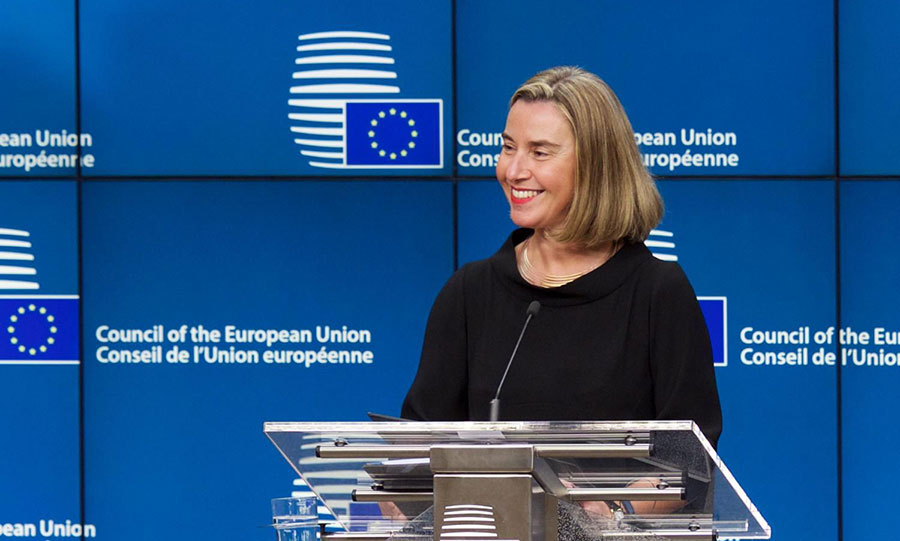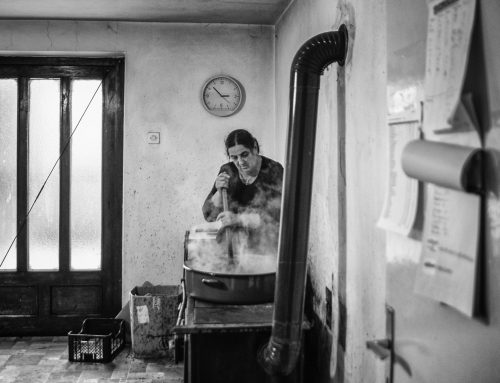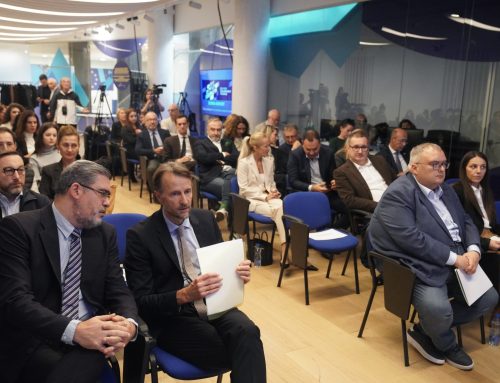Remarks by High Representative/Vice-President Federica Mogherini at the press conference following the 4th EU-Serbia Stabilisation and Association Council:
Check against delivery!
It was really a pleasure for me to welcome Prime Minister [of Serbia, Ana] Brnabić for the second time in Brussels in a few months. Her first official visit outside of the region was to the European institutions a few weeks ago. So, this was clearly not only a political sign, but also now, today, a pleasure to welcome her again, here this time, for the Stabilisation and Association Council.
Relations between the European Union and Serbia are strong and intensive, as show the quality and also the numbers of meetings we have. I have just met President [of Serbia, Aleksandar] Vučić, here, in Brussels, yesterday, as well.
With ten chapters opened, two of them being provisionally closed, Serbia has been making extremely good progress on its way to the European Union. And, this is our common strategic goal, our common strategic interest, unambiguously re-affirmed both by the Serbian government and by the European Union side. I have to say, on the European Union perspective of Serbia and of all the Western Balkan region, there is a strong European Union commitment – I think it is a shared commitment – and stronger than never, I would say.
President [of the European Commission, Jean-Claude] Juncker’s statement during the State of the Union address was clear – a clear and positive signal for all the Western Balkans. He made clear that a door of the European Union is open to further accession, once the countries concerned have met the criteria, and that we are working for this to happen in partnership. And, as he also mentioned, I have always believed the future of the European Union will not be with 27 Member States but more than 27 Member States.
The pace of this obviously depends on the pace at which each country implements reforms in all relevant areas. And our common work is exactly focused on this reform agenda, not for the sake of the European Union accession process, but for the sake of the transformation of societies and the countries in the region.
We welcome very much that the Serbian government has shown strong commitment and determination to further reforms, exactly with the spirit of meeting the expectations of the Serbian citizens.
This includes reforms in all different sectors, including in the area of rule of law, with the involvement of all stakeholders. We believe that this area is also key to the economic growth and investments in Serbia that could have even more significance and impacts with deep reforms in the areas of rule of law, but also justice reform, anti-corruption and fundamental rights. These are elements that constitute key elements in our negotiations, but these are also elements to which the business community looks at. So, this is definitely not a request from Brussels, but an interest of the Serbian citizens.
I would also like to underline my appreciation for Serbia’s commitment to the European Union facilitated Dialogue between Belgrade and Pristina and the work on the new phase we have started that was confirmed today by the government, but also yesterday when I met President [of Serbia, Aleksandar] Vučić here, in Brussels.
The European Union facilitates this Dialogue that – as you know – we have brought to a different phase with direct involvement of the two Presidents. But obviously the key to success – I would say the key to further success – lies in Belgrade and Pristina. It is always reassuring for me, but also challenging to see the determination and the political will to move forward on this seriously and with determination. We will help the two parties to bring this work and carry it forward.
In this respect, the internal dialogue on Kosovo launched by Serbia internally, with the prospect of a comprehensive normalisation of relations between the two sides, is very important. We discussed the fact that this internal dialogue has started in Serbia. We believe this is also crucial for the European Union perspective of the two sides, especially because it responds to the key principle that is at the basis of the foundation of the European Union architecture, that, more than looking to the past, we have our institutions and our citizens looking at future and at cooperation.
We also stressed, during our meetings today, as always, that stability and peace, and good neighbourly relations in the region remains key. Reconciliation, regional cooperation are key and core principles on which also the European Union was built, enabling former adversaries to become partners.
I personally believe that the long history of wars among countries that are today part of the same political union – the European Union – that had been fighting each other for thousands of years can ensure and inspire the Western Balkans deeply. We, in the European Union, find out that the key of success, including economic success, was when we stopped fighting each other and started making business together, and discovered that cooperation is more convenient for our citizens than confrontation. I think, this is the same way that the Western Balkans – and Serbia – have chosen to take.
The commitment that Serbia is showing to the region, the active and constructive contribution to reinforce cooperation in the region, trying to overcome some of the ghosts of the past and trying to build the bright avenues and bridges to the future: these are all elements that are deeply appreciated.
Starting from economic cooperation, infrastructures, we see that this is really European way of living with neighbours, improving the lives of citizens. So, the message is to continue like this on this way, especially when it comes to building and investing in regional cooperation and good relations.
To conclude, the European Union and Serbia are close partners and friends. The European Union is by far Serbia’s first political, trade and economic partner. Financial assistance by the European Union alone amounts to about €200 million in grants every year. And, I know, your figures are even more impressive. If I am not wrong, you mentioned the fact that the EU investments, when it comes to our support to reforms and developments in Serbia, represent €9 billion since the year 2000. So, this is just one figure that tells everything about how deep, strong and important our common work is.
It is now our firm and common intention to make this friendship and partnership grow even more, making irreversible progress on the European Union integration path for Serbia and for the entire region. Thank you.
Link to the video: https://ec.europa.eu/avservices/video/player.cfm?ref=I146537
Q. My question would be about the Dialogue between Belgrade and Pristina. You said that a new phase is ongoing. When do you expect that it will be more visible because we don’t see much of that happening right now. Also, your expectation was that in the next year, there will be a qualitative leap. Do you really expect that and what would that mean? Does it mean that you expect in the next year, Serbia and Kosovo to reach the binding agreement on normalisation?
On the dialogue, you know the visibility is important but sometimes the role of the person who facilitates the Dialogue is also to protect it. The results or the content of this new phase will become more visible at the moment when it will be useful for the dynamics of the new phase of the Dialogue. For me, in this moment, what is essential is to not only facilitate but also protect the space for the two parties to work on this new phase – both internally and between them.
So, you have seen that there have been meetings at a much more frequent pace than before between the two sides, at the level of Presidents. We have changed the format; we have changed the speed and we have changed the agenda somehow of what we are discussing, looking at the qualitative leap, that, yes, I believe is still and very much possible to achieve.
The dialogue is about normalisation of relations; the objective of the dialogue is not the dialogue, it is the objective of reaching the normalisation of relations. So, the success of the dialogue is not measured in terms of its visibility, but in terms of trying hard to reach probably one of the most difficult objectives we have in the region, but that would benefit the entire region and the European Union process of both sides, because Serbia knows well and its European Union perspective is also linked to the success of the dialogue.
And when I say success of the dialogue, it means finding a place where the region wins, the two sides win, even if all would have to give up something. But I have never believed and I still do not believe in zero-sum game, and especially in this case the work we are doing is to try and identify a sustainable solution for all.
Having said that, I would like to stress one additional point. Implementation of the already agreed parts is very important. As Ana [Brnabić] mentioned, the implementation of the Association/Community, but also agreements on energy that for the moment have not been implemented require further work on both sides.
But what is important to me, is together with this, also to provide this protected space for having the two parties engaging in reaching the objectives of the Dialogue and I believe that this is possible – difficult, but possible. You know, my favourite quote is from Nelson Mandela: “It is always impossible until it is done.” And this is the perfect case.
Q. When you are talking about qualitative leap, you are talking about solutions. Can you be more clear; are these metaphors for actual signatures on the paper by the end of 2018?
No, I will not be clear – sorry, you ask direct questions and I think you expect clears answers. No, I cannot be clear and I do not want to be clear on when and what exactly the outcome of this new phase of the Dialogue will be, exactly because I feel the need in this phase to protect the political space for the two parties to work on this new phase of the Dialogue.
In terms of content, work is ongoing at the level of Presidents – extremely dedicated, focused, intense work with us and with our teams. As this work is ongoing, I would not share publicly the content of it or the perspective of it.
I am just saying that there are two elements there. One, which should not be forgotten at this stage, is the implementation of the already agreed text and measures. The continuation of the positive results that the Dialogue has already achieved – I will just mention agreements that have been implemented so far, most recently the one on justice, but also telecoms, police, civil protection, civil registry, freedom of movement with the exception of licence plates related provisions. But we are working also on – as you know – the full reopening of the Mitrovica bridge that I visited last time I was in Kosovo; but also customs’ stamps, customs’ revenue collection, regional cooperation, liaison agreements.
All things that might sound small, but for doing every small step, we spend hours and hours, hours of night and day work – including at the highest political level sometimes. So, preserving the already implemented agreements, finalising the full implementation of the already agreed texts and intense work that we are facilitating on the request of the two parties of this new phase to try and have this qualitative leap in a short period of time.
I might remind us all that our mandate has an expiring date which is two years exactly from now: so the short time framework is also given by this to try and come to positive results sooner rather than later, and in a time where both in Pristina and in Belgrade we have leaderships that have just been result of recent elections and so have clear political space to act.
So, I will share content, expectations and timetables only at a later stage and only after having agreed this with the parties.
Link to the video: https://ec.europa.eu/avservices/video/player.cfm?ref=I146539




